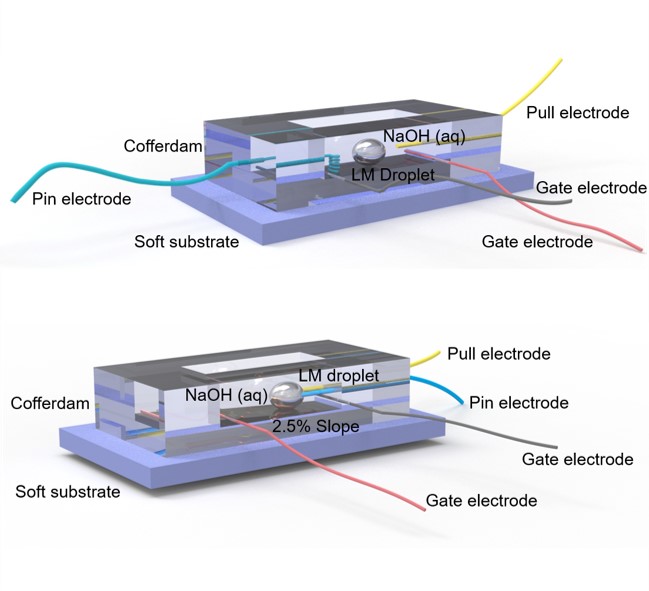Soft robot has advantages of flexible actuating strategies, various patterns of movement, and friendly interaction with humans. However, due to the lack of suitable practical methods and soft controllers, fabricating a fully integrated flexible robot remains a major challenge.
Based on the deformation and locomotion behavior of liquid metals (LMs) via electrical stimulus, Prof. LIU Jing’s team from Technical Institute of Physics and Chemistry (TIPC), CAS, proposed and demonstrated a new type of liquid metal droplet electronic device. The new device could be organized further into gate logics to execute logical computing. Advanced Intelligent Systems has published this work online.
The importance of LMs in intelligent electronic control systems has been shown for the first time in this work. It has also provided a new method to manufacture soft electronic devices.
"As a new class of smart materials, liquid metal is inherently flexible, electrically conductive and responsive to stimuli. It is highly possible to develop soft intelligent electronic devices and explore the potential application of LMs in control systems," said Prof. LIU.
The new device removes the reliance on semiconductor by directly constructing electronic devices on soft materials to perform logical operations and calculations.
A variety of logic gates can be easily manufactured through different connections to liquid metal droplets electronic devices, which have shown stable functionality for binary logic calculation. Therefore, it may become the cornerstone of more delicate logic integrations.
To demonstrate the feasibility of application, researchers constructed a soft four-degree logic accumulator via LMs droplet electronic device, which can regulate a pneumatic soft gripper within four states of inflation.
The spatial scale of LM involved motion is quite small without bulky ancillary equipment and easy for miniaturization and integration.
In this research, the trial of LM-based logic devices demonstrates the potential that electrically-induced variations of liquid in a macroscale can be designed as processors for reception, conversion and exportation of electrical signals. Owing the natural harmony with soft structures, they may hold a promise for the ultimate autonomy and control of soft robots in the near future.

Figure 1. Structural Principles of LM Droplet Electronic Devices (Image by LIU et al.)
https://onlinelibrary.wiley.com/doi/10.1002/aisy.202000246
NEWS